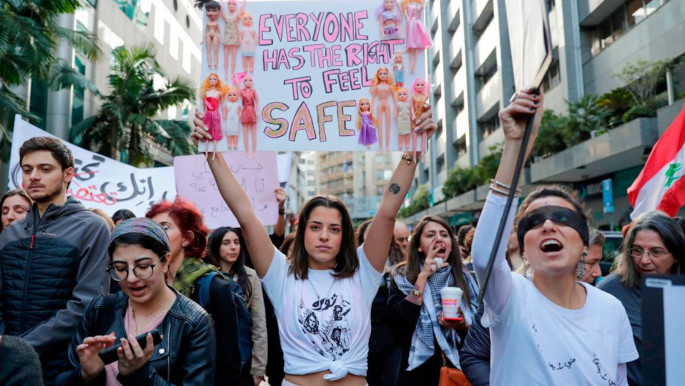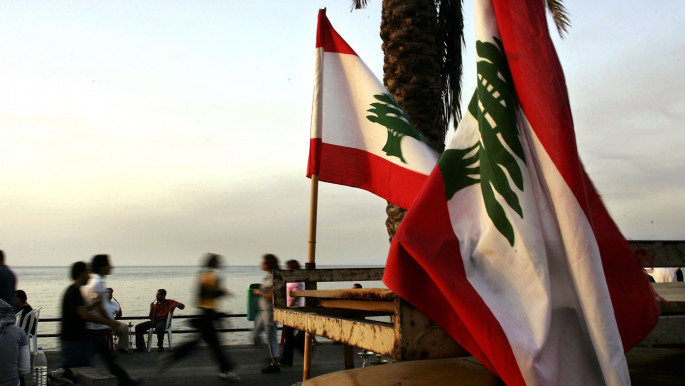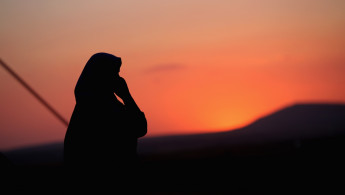As family courts close, women struggle to access justice during Middle East lockdowns
Divorce and custody cases have been postponed indefinitely in some countries, while countless women are without work. Many find themselves in closer proximity to their abusers, while others struggle to access their monthly child maintenance allowance.
This cauldron of woes, exacerbated by the pandemic, has placed women at greater risk, with their safety, basic rights and hard-earned independence under renewed threat.
The legal realities in a region characterised by atrophied justice systems vary from one country to another. With the exception of Tunisia, whose legal proceedings have transitioned online, the pandemic has rendered legal services widely inaccessible across Iraq, Libya and Lebanon, among other Middle Eastern states.
As the health emergency continues, women are instead seeking out alternative forms of arbitration and solutions.
Lawyers, legal associations and activists in Libya are advocating for the digitisation of judicial services in accordance with Law 7 of the year 2014, which sanctions the use of remote trials and digital evidence processing, Benghazi based lawyer Nsreen Amer told The New Arab.
 |
Women in the Middle East have faced a steep decline in freedoms during Covid-19 lockdowns, an injustice compounded by the widespread closure of legal courts |  |
Court hearings in Libya were suspended on 1 Apr 2020, under a decree issued by the Supreme Judicial Council (SJC), Amer explains. "The shuttering, under the issued order, will last until 15 June, by when the judiciary's two-month annual recess will take effect," the lawyer said. "Court life", she added, "is therefore unlikely to resume before October".
Amer is mobilsing legal and civil society activists well versed on statutory and personal status laws from Libya's east to its west. Together they have undersigned a letter appealing to the SJC to postpone its recess as an emergency measure designed to keep the legal proceedings afloat. "The abrupt suspension of court proceedings has stripped women of their civil liberties," she laments.
 |
|
| 'Violence is a virus': Tunisia opens new women's shelter as domestic abuse surges during lockdown |
Amer shared the story of a widowed wife of seven children, who after months of toiling to secure a kitchen space in Benghazi run by internally displaced and widowed women she had trained, was ordered to close down her business by the Municipal Guard.
"She's been left with nothing," Amer said, "and if enforced closure wasn't enough, she has been ordered to pay rent on a kitchen she cannot use as well as the home she rents out". Amer shares another story. This time of a 29-year-old orphaned woman whose drug abusing husband divorced her and forced her out on the streets.
"She has nowhere to turn, shuttled between temporary accommodations provided by civil society activists," Amer said.
"Four murders - all wives killed by their spouses - were reported since the coronavirus outbreak," the Benghazi lawyer counted. She emphasised that the fear of being stigmatised finds women retreating into silence instead of speaking out or reporting abuse, in a society where systemic violence against them is unchallenged. "The harm they now face has been more debilitating than Covid-19 itself," Amer said.
Novel initiatives that had made important strides towards gender equality in Libya have been watered down as a result of the pandemic. Prior to life under lockdown, Amer trained Benghazi's Women's Police Unit on how to respond to cases of domestic abuse.
 |
The fear of being stigmatised finds women retreating into silence instead of speaking out or reporting abuse, in societies where systemic violence against them is unchallenged |  |
Prior to that in 2014, in response to pressure from civil society organisations, the then-minister of justice submitted a draft law highlighting urgent care needed for survivors of abuse and rape, most notably, the law called for the creation of women's shelters in a country where none exist.
The lack of resources has not stood in Amer's way, as she and others harness online technologies to keep advocacy efforts alive. In contrast, authorities caught in the crosshairs of war, east and west of the country, remain unmoved by their efforts.
"Women are repeatedly told to put up with the situation. War is the priority in a country without a constitution. If women let out so much as a whimper regarding their denied rights, society turns the other way," Amer said.
From one war-ravaged country to another, in Iraq desperation has plunged women down the rabbit hole of tribal arbitration, veteran lawyer and project manager at Baghdad Women's Association Rasha Khalid told The New Arab. "Covid-19 has strengthened the rule of tribal laws, in which the best representation a woman has is her father - who unquestionably kowtows to tribal norms," she said.
 |
|
| Read more: Trapped with domestic abusers: How Covid-19 lockdowns are endangering vulnerable women across the Middle East |
Iraqi Lawyer Ayad al-Qaisy told The New Arab that legal proceedings and lawsuits were postponed "with the exception of urgent cases" under an order issued by the Iraqi Council of State.
"The judiciary's emergency department issued an order stating that relevant authorities must continue to dispense custody and dowry payments to affected women, but until now, we have not seen anything more than ink on paper," the Baghdad lawyer told The New Arab. The closure of legal offices, Qaisy added, has left recipients of child maintenance, largely widows and sole providers, empty handed.
The return to tribal 'justice' is beyond risky for women, whose rights have been curtailed by years of uninterrupted war, incompetent counsel and not least, state negligence. Khalid explains that under tribal courts, women are forced to remain in abusive marriages or are expected to forfeit their custody and marriage rights.
While speaking to The New Arab Khalid is frequently interrupted by relentless calls and electricity outages. "When the power goes out so does the internet," the Baghdadi lawyer joked in apology. She explained that her mobile phone doubles up as a domestic violence hotline for women in urgent need, to explain the deluge of phone calls.
 |
The return to tribal 'justice' is beyond risky for women, whose rights have been curtailed by years of uninterrupted war, incompetent counsel and not least, state negligence |  |
"At midnight last week, I received a call from an unknown number," Khalid said. "It was the neighbour of a woman that I had gotten to know well, from Bismayah City".
"On this night, her dipsomaniac husband beat her so hard that he cracked her skull," Khalid told The New Arab. "It came one week after he'd broken her foot." President of the Baghdad Women's Association Liza Hido explains that the lack of digital avenues for court proceedings and shrinking legal aid are pushing women to obtain guidance from tribal chieftains. "Some women cannot sit back hand-on-cheek as violence against them escalates," Khalid expressed.
 |
|
| Read more: Trapped in Lebanon: Fears of abuse for migrant domestic workers amid Covid-19 lockdown |
In a society where tribal arbitration grants violent male spouses impunity, female rights are invariably denied. "Under national civil courts, at least there are orders of arrest, penalties, investigations and medical examinations. Tribal courts offer none of these," Rashid said.
The past month of lockdown has seen two grisly murders - the hanging of a seven-month pregnant woman in Diyala and 20-year-old Malak al-Zubeidi, doused in gasoline and lit on fire by her husband. These harrowing incidents elicited a response from international rights groups, renewing their plea to the Iraqi government to prosecute violence against women with sentences commensurate to the crime.
Six unrelenting years of war in Yemen has also brought harmful practices to the surface of daily life. The war has normalised child marriage and filled the streets with women, begging and peddling cheap goods," President of the Yemen Peace school Lamia al-Aryani told The New Arab. "As war rages on, women are penalised the most," a situation that has been exacerbated by Covid-19, she explains.
War-fuelled militarisation in Yemen has redefined the role and contribution of women in society, Aryani said. "On all fronts, women are exposed to violence. Luckily, mainly educated women have maintained jobs, although most are part-time, private sector gigs." In Sanaa and elsewhere women were among the first to be laid off as the coronavirus dawned.
 |
A woeful spike in domestic violence and sexual assault has transformed homes into prison wards from which women have no escape from their 'guard' |  |
"Worse still, women represent the largest proportion of Yemen's medical staff, and are therefore at greater risk of catching the virus. Who will come to their aid if they fall ill?" she asked, describing a context where precautionary measures are few and far between.
No different to her Libyan and Iraqi counterparts, Aryani speaks of a woeful spike in domestic violence and sexual assault, as the pandemic transforms homes into prison wards from which women have no escape from their "guard".
Unfolding tragedies across the region precede Covid-19, particularly in countries driven to the cliff edge by cyclical wars and civil strife. Ill-equipped legal systems and the termination of essential services and the closure of payment offices, has compounded state paralysis. All the while, women's lives hang by a thread.
As the freeze of Covid-19 is yet to thaw, female activists and lawyers offer a flicker of light in a sea of darkness, determined to assist female-headed households and single women - whether estranged, widowed and divorced - the segment of Middle Eastern societies hardest hit by these testing times.
Nazli Tarzi is a freelance British-Iraqi journalist, specialising in Middle East politics, with a particular interest in Iraqi affairs.
Follow her on Twitter: @NazliTarzi



